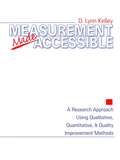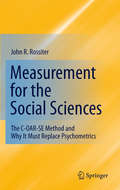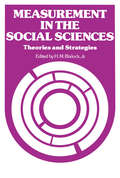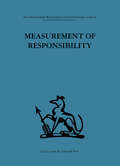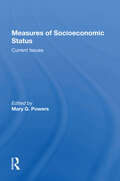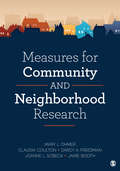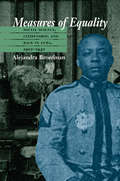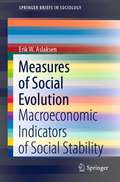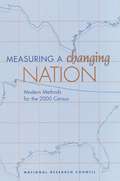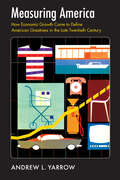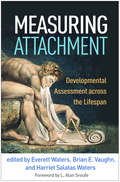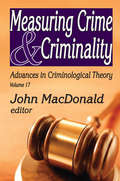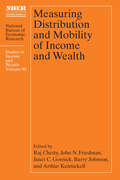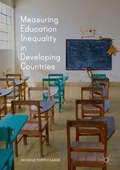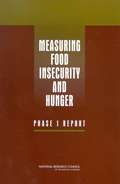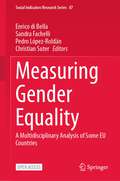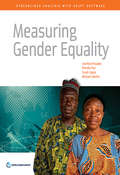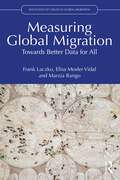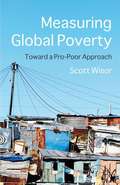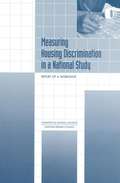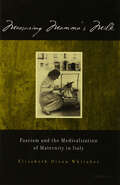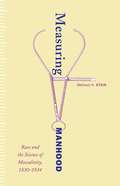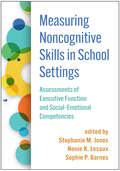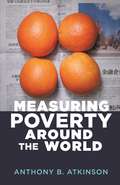- Table View
- List View
Measurement Made Accessible: A Research Approach Using Qualitative, Quantitative and Quality Improvement Methods
by Reader D KelleyThrough examples and exercises, this handy student guide teaches methods for sampling, data gathering, developing questionnaires, reliability and validity, and quantitative and qualitative measurement. In addition, the book explains the use of quality improvement tools and techniques in measurement. It will be invaluable in any graduate statistics course, particularly for those in business administration and management.
Measurement for the Social Sciences
by John R. RossiterThis book proposes a revolutionary new theory of construct measurement - called C-OAR-SE - for the social sciences. The acronym is derived from the following key elements: construct definition; object representation; attribute classification; rater entity identification; selection of item type; enumeration and scoring. The new theory is applicable to the design of measures of constructs in: * Management * Marketing * Information Systems * Organizational Behavior * Psychology * Sociology C-OAR-SE is a rationally rather than empirically-based theory and procedure. It can be used for designing measures of the most complex and also the most basic constructs that we use in social science research. C-OAR-SE is a radical alternative to the traditional empirically-based psychometric approach, and a considerable amount of the book's content is devoted to demonstrating why the psychometric approach does not produce valid measures. The book argues that the psychometric approach has resulted in many misleading findings in the social sciences and has led to erroneous acceptance - or rejection - of many of our main theories and hypotheses, and that the C-OAR-SE approach to measurement would correct this massive problem. The main purpose of this book is to introduce and explain C-OAR-SE construct measurement theory in a way that will be understood by all social science researchers and that can be applied to designing new, more valid measures. Featuring numerous examples, practical applications, end-of-chapter questions, and appendices, the book will serve as an essential resource for students and professional researcher alike.
Measurement in the Social Sciences
by Hubert M. BlalockAmong the frustrations constantly confronting the social scientist are those associated with the general process of measurement. The importance of good measurement has long been recognized in principle, but it has often been neglected in practice in many of the social sciences. Now that the methodological tools of multivariate analysis, simultaneous-equation estimation, and causal modeling are diffused more widely into the social sciences, and now that the very serious implications of random and non-random measurement errors are being systematically investigated, it is all the more important that social scientists give top priority to the quality of their data and the clarity of their theoretical conceptualizations. The book is organized so that, one proceeds from problems of data collection to those of data analysis. It is not intended to be a complete work covering all types of measurement problems that have arisen in the social sciences. Instead, it represents a series of studies that are deemed to be crucial for the advancement of social science research but which have not received sufficient attention in most of the social sciences. The basic purpose is to stimulate further methodological research on measurement and to study the ways in which knowledge that has been accumulated in some fields may be generalized. Part I is concerned with applying scaling approaches developed in psychometrics to problems that arise in other social sciences. The focus is on finding better ways to ask questions of respondents so as to raise the level of measurement above that of simple ordinal scales. Part II focuses on multiple-indicator theory and strategies as applied to relatively complex models and to change data. In this section the emphasis shifts to how one analyzes fallible data through the construction of explicit measurement-error models. Part III deals with the statistical analysis of ordinal data, including the interpretation and empirical behaviors of various ordinal measures of association.
Measurement of Responsibility: A study of work, payment, and individual capacity (International Behavioural And Social Sciences Ser. #Vol. 51)
by Elliott JaquesTavistock Press was established as a co-operative venture between the Tavistock Institute and Routledge & Kegan Paul (RKP) in the 1950s to produce a series of major contributions across the social sciences. This volume is part of a 2001 reissue of a selection of those important works which have since gone out of print, or are difficult to locate. Published by Routledge, 112 volumes in total are being brought together under the name The International Behavioural and Social Sciences Library: Classics from the Tavistock Press. Reproduced here in facsimile, this volume was originally published in 1956 and is available individually. The collection is also available in a number of themed mini-sets of between 5 and 13 volumes, or as a complete collection.
Measures Of Socioeconomic Status: Current Issues
by Mary G PowersThis text consists of a collection of seven papers which look at constructing measures of occupational socioeconomic status by combining census data on occupation-specific levels of education and income; including different approaches.
Measures for Community and Neighborhood Research
by Dr Mary L. Ohmer Claudia J. Coulton Darcy A. Freedman Joanne L. Sobeck Jamie BoothMeasures for Community and Neighborhood Research, by Mary L. Ohmer, Claudia Coulton, Darcy A. Freedman, Joanne L. Sobeck, and Jamie Booth, is the first book of its kind to compile measures focused on communities and neighborhoods in one accessible resource. Organized into two main sections, the first provides the rationale, structure and purpose, and analysis of methodological issues, along with a conceptual and theoretical framework; the second section contains 10 chapters that synthesize, analyze, and describe measures for community and neighborhood research, with tables that summarize highlighted measures. The book will get readers thinking about which aspects of the neighborhood may be most important to measure in different research designs and also help researchers, practitioners, funders, and others more closely examine the impact of their work in communities and neighborhoods.
Measures for Community and Neighborhood Research
by Dr Mary L. Ohmer Claudia J. Coulton Darcy A. Freedman Joanne L. Sobeck Jamie BoothMeasures for Community and Neighborhood Research, by Mary L. Ohmer, Claudia Coulton, Darcy A. Freedman, Joanne L. Sobeck, and Jamie Booth, is the first book of its kind to compile measures focused on communities and neighborhoods in one accessible resource. Organized into two main sections, the first provides the rationale, structure and purpose, and analysis of methodological issues, along with a conceptual and theoretical framework; the second section contains 10 chapters that synthesize, analyze, and describe measures for community and neighborhood research, with tables that summarize highlighted measures. The book will get readers thinking about which aspects of the neighborhood may be most important to measure in different research designs and also help researchers, practitioners, funders, and others more closely examine the impact of their work in communities and neighborhoods.
Measures of Equality
by Alejandra BronfmanIn the years following Cuba's independence, nationalists aimed to transcend racial categories in order to create a unified polity, yet racial and cultural heterogeneity posed continual challenges to these liberal notions of citizenship. Alejandra Bronfman traces the formation of Cuba's multiracial legal and political order in the early Republic by exploring the responses of social scientists, such as Fernando Ortiz and Israel Castellanos, and black and mulatto activists, including Gustavo Urrutia and Nicolas Guillen, to the paradoxes of modern nationhood.Law, science, and the social sciences--which, during this era, enjoyed growing status in Cuba as well as in many other countries--played central roles in producing knowledge and shaping social categories in postindependence Cuba. Anthropologists, criminologists, and eugenicists embarked on projects intended to employ the tools of science to rid Cuba of the last vestiges of a colonial past. Meanwhile, the legal arena created both new freedoms and new modes of repression. Black and mulatto intellectuals and activists, working to ensure that citizenship offered concrete advantages rather than empty promises, appropriated changing social scientific and legal categories and turned them to their own uses. In the midst of several decades of intermittent racial violence and expanding social and political mobilization by Cubans of African descent, debates among intellectuals and activists, state officials, and legislators transformed not only understandings of race, but also the terms of citizenship for all Cubans.
Measures of Social Evolution: Macroeconomic Indicators of Social Stability (SpringerBriefs in Sociology)
by Erik W. AslaksenThis book extends a previously published model of social evolution by using macroeconomic measures to indicate both the current state of the society, and its evolutionary trajectory. This model considers society as a system of interacting elements evolving through stages of increasing strength of interaction and complexity of structure. It measures society in constituting the world collectively, with nation-states as the elements, here described through macroeconomic measures such as GDP, government expenditure, and inequality. The economic data presented indicates that this stage is approaching the next evolutionary step, which is either the formation of a world society of nations, with an associated overarching common infrastructure absorbing some of the sovereign functions of nation-states as they exist today, or as a society of competing groups of nations, each bound by alliances and bilateral agreements. The book explores how the former faces great obstacles in the form of nationalism and a misunderstood concept of sovereignty, and poses that it is in an embryonic stage. The author poses that it is this structure that would be best equipped to handle common challenges, such as the environment and global warming, and topically, pandemics. A novel interdisciplinary text in social complexity, this book is of interest to researchers in socio-economic fields.
Measuring A changing Nation: Modern Methods for the 2000 Census
by Panel on Alternative Census MethodologiesInformation on the Modern Methods for the 2000 Census
Measuring America: How Economic Growth Came to Define American Greatness in the Late Twentieth Century
by Andrew YarrowThe United States has always fancied itself a nation apart--"exceptional" in its values, traditions, and way of life. For most of the country's history, ideas about what made America distinctive generally were framed in terms of a liberal idealism rooted in the thought of John Locke and articulated by Jefferson, Madison, and other Founders. While some commentators also observed that the United States was a land of plenty, it wasn't until the mid-twentieth century that material abundance emerged as the principal standard of American "greatness," as measured by a host of new economic indicators. Beginning in earnest in the wake of World War II, opinion-shapers in politics, business, academia, the media, the schools, and public diplomacy gloried in the nation's booming economy. Where "plenty" had once been a largely abstract concept, it was now quantifiable, thanks to new national income accounting and other economic data collection and analysis techniques. One could tally up production and consumption of an ever-expanding cornucopia of goods and services that made up the gross national product (GNP), the king of postwar statistics. American preeminence and American identity were increasingly linked with this measurable prosperity, presented in the language of a newly influential economics profession. In Measuring America, Andrew L. Yarrow explores this history, telling two parallel, interlocking stories--of how economic ideas came to have vastly greater influence on American culture after World War II, and how those ideas dovetailed with a growing belief that the meaning and value of the United States resided in its material output. How and why this new way of "measuring America" developed, how it was expressed, and what it has meant and means for Americans today are the subject of this well-researched and insightful book.
Measuring Attachment: Developmental Assessment across the Lifespan
by Everett Waters, Brian E. Vaughn and Harriet Salatas WatersThis volume provides an in-depth examination of traditional and emerging measures of attachment behavior and representations from infancy to adulthood. Leading authorities share their expertise on the Strange Situation, the Attachment Q-set, Ainsworth's Maternal Sensitivity Scales, the Adult Attachment Interview, the Attachment Script Assessments, and the Adult Attachment Projective Picture System, as well as analogue and experimental methods. The book clarifies the conceptual and empirical underpinnings of the various measures and shows how they fit into a coherent developmental framework. Offering detailed discussions of key constructs such as attachment security, the secure base phenomenon, disorganization, and narrative structure, this is a valuable resource for both researchers and practitioners who use attachment assessments in their work.
Measuring Crime and Criminality: Advances In Criminological Theory (Advances in Criminological Theory #17)
by John MacDonaldMeasuring Crime and Criminality focuses on how different approaches to measuring crime and criminality are used to test existing criminological theories. Each chapter reviews a key approach for measuring criminal behaviour and discusses its strengths or weaknesses for explaining the facts of crime or answers to central issues of criminological inquiry. The book describes the state of the field on different approaches for measuring crime and criminality as seen by prominent scholars in the field. Among the featured contributions are: The Use of Official Reports and Victimization Data for Testing Criminological Theories; The Design and Analysis of Experiments in Criminology; and Growth Curve/Mixture Models for Measuring Criminal Careers. Also included are papers titled: Counterfactual Methods of Causal Inference and Their Application to Criminology; Measuring Gene-Environment Interactions in the Cause of Antisocial Behaviour and What Has Been Gained and Lost through Longitudinal Research and Advanced Statistical Models? This volume of Advances in Criminological Theory illustrates how understanding the various ways criminal behaviour is measured is useful for developing theoretical insights on the causes of crime.
Measuring Distribution and Mobility of Income and Wealth: Studies in Income and Wealth (National Bureau of Economic Research Conference Report)
by Raj Chetty, John N. Friedman, Janet C. Gornick, Barry Johnson and Arthur KennickellA collection of twenty-three studies that explore the latest developments in the analysis of income and wealth distribution and mobility. Economic research is increasingly focused on inequality in the distribution of personal resources and outcomes. One aspect of inequality is mobility: are individuals locked into their respective places in this distribution? To what extent do circumstances change, either over the lifecycle or across generations? Research not only measures inequality and mobility, but also analyzes the historical, economic, and social determinants of these outcomes and the effect of public policies. This volume explores the latest developments in the analysis of income and wealth distribution and mobility. The collection of twenty-three studies is divided into five sections. The first examines observed patterns of income inequality and shifts in the distribution of earnings and in other factors that contribute to it. The next examines wealth inequality, including a substantial discussion of the difficulties of defining and measuring wealth. The third section presents new evidence on the intergenerational transmission of inequality and the mechanisms that underlie it. The next section considers the impact of various policy interventions that are directed at reducing inequality. The final section addresses the challenges of combining household-level data, potentially from multiple sources such as surveys and administrative records, and aggregate data to study inequality, and explores ways to make survey data more comparable with national income accounts data.
Measuring Education Inequality in Developing Countries
by Nichole Torpey-SaboeThis book constructs a measure of education inequality using time-series cross-national data and utilizes real-world examples based on author interviews. It provides insights into how classic trade theory might be applied more broadly to generate expectations not only about income distribution, but also about investment in human capital. The project explores the ways in which global trends toward urbanization and democratization might be expected to impact education inequality. The author addresses contemporary issues in politics, such as growing income inequality, the backlash against globalization and free trade, and concerns that democratic institutions are elite-dominated and unresponsive to the needs of common citizens.
Measuring Food Insecurity And Hunger: Phase 1 Report
by National Research Council of the National AcademiesThe National Academies Press (NAP)--publisher for the National Academies--publishes more than 200 books a year offering the most authoritative views, definitive information, and groundbreaking recommendations on a wide range of topics in science, engineering, and health. Our books are unique in that they are authored by the nation's leading experts in every scientific field.
Measuring Gender Equality: A Multidisciplinary Analysis of Some EU Countries (Social Indicators Research Series #87)
by Christian Suter Pedro López-Roldán Sandra Fachelli Enrico Di BellaIn this open access book, the editors explicitly address the issue of measuring gender equality. The book introduces readers to basic concepts of gender equality, equity and equal opportunities, then discusses measuring these phenomena, the methods of constructing indicators, and reviews the main indicators that have been proposed at the international level to measure gender equality. It then sets the theoretical discussions against the findings from a Jean Monnet project financed by the European Union to highlight the importance of a regional analysis of gender equality in four main study areas: Italy, Spain, France and Germany. The results make it clear that it is necessary to move from the purely national perspective hitherto used in gender equality analyses to a regional one because differences can be highly pronounced even within the same country. This is a self-contained volume requiring limited statistical expertise for the reader and is aimed at social researchers and policymakers who wish to address gender equality from a quantitative perspective.
Measuring Gender Equality: Streamlined Analysis with ADePT Software
by Zurab Sajaia Josefina Posadas Lokshin Pierella PaciGender equality is a core development objective in its own right and also smart development policy and business practice. No society can develop sustainably without giving men and women equal power to shape their own lives and contribute to their families, communities, and countries. And yet, critical gender gaps continue to exist in all countries and across multiple dimensions. The gender module of the World Bank’s ADePT software platform produces a comprehensive set of tables and graphs using household surveys to help diagnose and analyze the prevailing gender inequalities at the country level and over time. This book provides a step-by-step guide to the use of the ADePT software and an introduction to its basic economic concepts and econometric methods. The module is organized around the framework proposed by the World Development Report 2012: Gender Equality and Development. It covers gender differences in outcomes in three primary dimensions of gender equality: human capital (or endowments), economic opportunities, and voice and agency. Particular focus is given to the analysis and decomposition techniques that allow for further exploring of gender gaps in economic opportunities.
Measuring Global Migration: Towards Better Data for All (Routledge Key Issues in Global Migration)
by Frank Laczko Elisa Mosler Vidal Marzia RangoThis book focuses on how to improve the collection, analysis and responsible use of data on global migration and international mobility.While migration remains a topic of great policy interest for governments around the world, there is a serious lack of reliable, timely, disaggregated and comparable data on it, and often insufficient safeguards to protect migrants’ information. Meanwhile, vast amounts of data about the movement of people are being generated in real time due to new technologies, but these have not yet been fully captured and utilized by migration policymakers, who often do not have enough data to inform their policies and programmes. The lack of migration data has been internationally recognized; the Global Compact for Safe, Orderly and Regular Migration urges all countries to improve data on migration to ensure that policies and programmes are "evidence-based", but does not spell out how this could be done. This book examines both the technical data issues associated with improving data on migration and the wider political challenges of how countries manage the collection and use of migration data. The first part of the book discusses how much we really know about international migration based on existing data, and key concepts and approaches which are often used to measure migration. The second part of the book examines what measures could be taken to improve migration data, highlighting examples of good practice from around the world in recent years, across a range of different policy areas, such as health, climate change and sustainable development more broadly. Written by leading experts on international migration data, this book is the perfect guide for students, policymakers and practitioners looking to understand more about the existing evidence base on migration and what can be done to improve it.
Measuring Global Poverty
by Scott WisorThe author examines the moral, methodological, and practical problems that arise from poverty measurement. He establishes a methodological framework for analyzing poverty conceptions and measures, and concludes with concrete recommendations regarding both the procedures for and substance of future global poverty measurement.
Measuring Housing Discrimination in a National Study: REPORT OF A WORKSHOP
by Committee on National StatisticsA report on Measuring Housing Discrimination in a National Study
Measuring Mamma's Milk: Fascism and the Medicalization of Maternity in Italy
by Elizabeth Dixon WhitakerIn Italy as in other Western societies, the medicalization of basic biological functions contributes to the loss of personal confidence in the care of the body. Measuring Mamma's Milk analyzes the medicalization of maternity through a study of breastfeeding practices over a century of changes in socioeconomic organization, family life, and health beliefs. During the pivotal interwar period in Italy, fascism changed the relationship between the state and the public and greatly tightened the state's ties with medicine and science. "Rationalized" breastfeeding was at the heart of programs to reduce infant mortality rates in order to increase the size and "quality" of the population. Highly regimented feeding schedules, still practiced today, came to represent both an eternal, natural function and the conquest of fatal maternal ignorance by modern science. They also had important consequences for fertility and for maternal and child health. Through an interdisciplinary approach, Elizabeth Whitaker shows how fascism went beneath the surface to have a lasting impact on cultural beliefs and behaviors. Measuring Mamma's Milk will appeal to readers interested in Italy, fascism, and the care of young children as well as to scholars in medical and cultural anthropology, European history, history of medicine, and women's studies. Elizabeth Dixon Whitaker received her Ph.D. in anthropology from Emory University. She is the recipient of two Fulbright grants, the second of which sent her to the University of Bologna as a Senior Scholar in 1998-99. She is currently an independent scholar living in Washington, D.C.
Measuring Manhood: Race and the Science of Masculinity, 1830–1934
by Melissa N. SteinFrom the &“gay gene&” to the &“female brain&” and African American students&’ insufficient &“hereditary background&” for higher education, arguments about a biological basis for human difference have reemerged in the twenty-first century. Measuring Manhood shows where they got their start.Melissa N. Stein analyzes how race became the purview of science in nineteenth- and early twentieth-century America and how it was constructed as a biological phenomenon with far-reaching social, cultural, and political resonances. She tells of scientific &“experts&” who advised the nation on its most pressing issues and exposes their use of gender and sex differences to conceptualize or buttress their claims about racial difference. Stein examines the works of scientists and scholars from medicine, biology, ethnology, and other fields to trace how their conclusions about human difference did no less than to legitimize sociopolitical hierarchy in the United States.Covering a wide range of historical actors from Samuel Morton, the infamous collector and measurer of skulls in the 1830s, to NAACP leader and antilynching activist Walter White in the 1930s, this book reveals the role of gender, sex, and sexuality in the scientific making?and unmaking?of race.
Measuring Noncognitive Skills in School Settings: Assessments of Executive Function and Social-Emotional Competencies
by Stephanie M. Jones, Nonie K. Lesaux and Sophie P. BarnesChildren's social–emotional and self-regulation skills are critical for success in school and, ultimately, in the workplace. How can educators determine the most effective approaches for measuring students' interpersonal competencies? And how can they use the data to improve their own practice? Relevant for school leaders, educators, researchers, and other stakeholders, this book brings together leading experts from multiple disciplines to discuss the current state of measurement and assessment of a broad range of noncognitive skills and present an array of innovative tools. Chapters describe measures targeting the individual student, classroom, whole school, and community; highlight implications for instructional decision making; examine key issues in methodology, practice, and policy; and share examples of systematic school- and districtwide implementation.
Measuring Poverty around the World
by Anthony B. AtkinsonThe final book from a towering pioneer in the study of poverty and inequality—a critically important examination of poverty around the worldIn this, his final book, economist Anthony Atkinson, one of the world’s great social scientists and a pioneer in the study of poverty and inequality, offers an inspiring analysis of a central question: What is poverty and how much of it is there around the globe? The persistence of poverty—in rich and poor countries alike—is one of the most serious problems facing humanity. Better measurement of poverty is essential for raising awareness, motivating action, designing good policy, gauging progress, and holding political leaders accountable for meeting targets. To help make this possible, Atkinson provides a critically important examination of how poverty is—and should be—measured.Bringing together evidence about the nature and extent of poverty across the world and including case studies of sixty countries, Atkinson addresses both financial poverty and other indicators of deprivation. He starts from first principles about the meaning of poverty, translates these into concrete measures, and analyzes the data to which the measures can be applied. Crucially, he integrates international organizations’ measurements of poverty with countries’ own national analyses.Atkinson died before he was able to complete the book, but at his request it was edited for publication by two of his colleagues, John Micklewright and Andrea Brandolini. In addition, François Bourguignon and Nicholas Stern provide afterwords that address key issues from the unfinished chapters: how poverty relates to growth, inequality, and climate change.The result is an essential contribution to efforts to alleviate poverty around the world.
